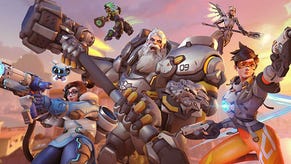Guild Wars
Gilded gold stars all round.
Guild Wars is my favourite game of the year so far, but I'll get back to that.
It's also a bit different. In one of the more ritualised and obscenely formalised sub-genres the PC offers, being a bit different to most Online RPGs isn't the hardest task in the world, but Guild Wars takes it further. It also confuses expectations, in that a glance at the screenshots could lead to you just filing it alongside every other persistent-world fantasy game playing across the net today. So we're going to break it down into bullet points, press the review's barrel against your temple and fire each one home deep into your brain, just to make sure everyone understands.
Also, get yourself a cup of tea and a tasty biscuit. This is a long one.
Indisputable Facts
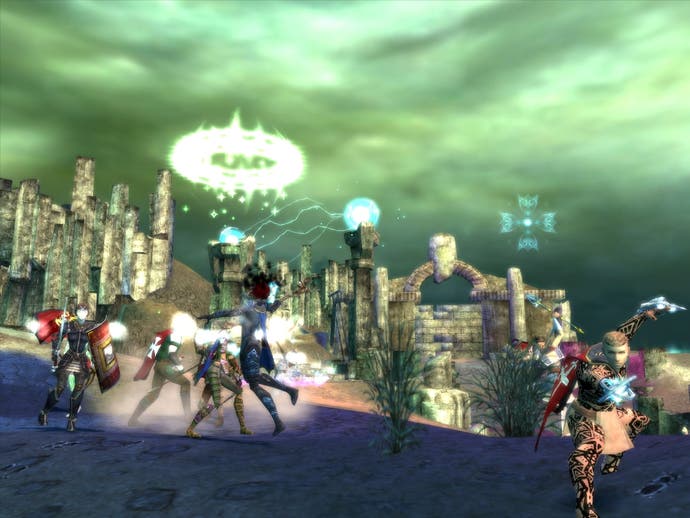
Guild War is a persistent Online Fantasy role-playing game.
It has no subscription fee. You buy the boxed copy then rather than paying a monthly fee to the developer to continue playing, you (er) don't.
That's an important bullet, so let's fire that load again. There is no subscription fee, no $10ish lump on your monthly VISA, no incremental leeching of your wealth into the coffers of the industry, no nothing. Pay once and you can play forever.
For the economists in the house, ArenaNet are planning regular (six to nine months) expansions pack for the game which add new content, continue the story, etc. Their stated aim is to make these entirely optional. This is in addition to a live team expanding the currently available game.
While most online games take the persistent world literally, and attempt to create shared place all the players (on an individual server anyway) adventure together, Guild Wars takes a more radical approach. Only the hub areas, which act like cities in most games of the genre, are shared with other random players. Once you head out of them into the wilds, they instance on a party-by-party basis. In other words, it's you and your friends (whether human or computer controlled henchmen) versus the world with no other people wandering around. This is the Player-versus-Environment section of the game.
The other half of the game, is the Player-versus-Player. Yet again, this is an instanced section with teams appearing in specially designed arenas. Modes vary from random pick-up play to a tournament where groups of eight compete with teams from all over the world.
Essentially, by dropping the more standard MMO tropes, it makes Guild Wars a hybrid of a team-based RPG-Unreal-Tournament and a party-based RPG adventure, with you skipping between the two modes depending on your whims. Though that's a bit close to being subjective analysis rather than objective facts, so we better get a move on.
There is an unusually low level-cap of 20. Once you reach this point ("Ascend"), you no longer gain in abstract levels of powers, but just flexibility. This is based on the game's main mechanic. Before leaving the hub areas you have to select eight of your collected array of powers which you'll use for the length of your trip into the monster-infested unknown. While the more experienced character will have more powers to choose from, so have more tactics available, the individual abilities aren't more or less powerful in and of themselves. Also, for the sakes of PvP battles, you can create an ascended character immediately to play around with, either of a predefined type or a custom one with the powers you've managed to unlock in the campaign game.
There are six character classes (Fighter, Monk, Elementalist, Mesmer, Ranger and Necromancer), which are all dual-classed. There are currently no races other than the ol' homo sapiens. Elementalists basically function like Mages. Monks are healers. Mesmers weaken foes with mind-warping powers (or De-buff in MMO parlance). Rangers, Necromancers and Fighters are Rangers, Necromancers and Fighters respectively.
That's enough facts, I think. Bored now.
Thoughts About Instancing
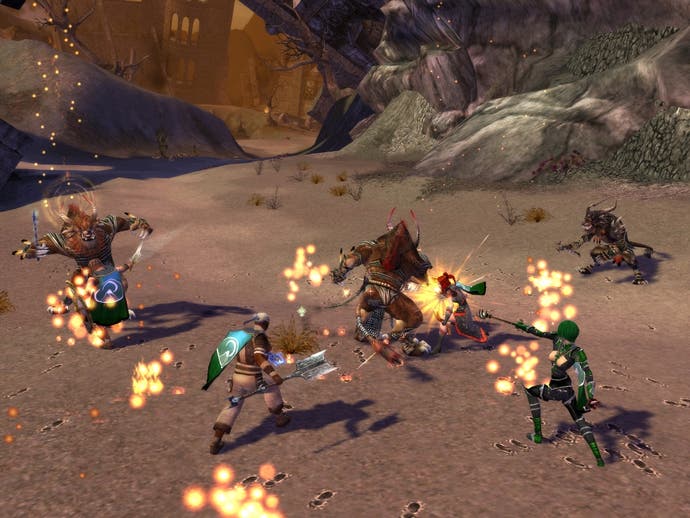
I was recently playing another MMO Beta. No name, as I'm currently under a non-disclosure agreement. It's very much based in the Korean model, with lots of extremely repetitive monster-bashing, but cute enough. At around 3am in the morning I had a moment of terrifying clarity as I pulled back my camera to examine the surroundings. I was in a field packed full of people, all hacking down virtually identical monsters with their own virtually identical attacks and sullenly ignoring each other. Everyone's attacks, for a second, seem to synchronise, in a steady heartbeat, pumping XP through the body of the playerbase and money into the heart of the developer. This is humanity reduced to the rhythm of a machine, the player as a combine-harvester, the point of the game suddenly clear. Not to be fun, but to be addicting. I was in a Killing Field. If this is all that MMOs are - and the core of most mainstream MMOs are - what exactly is the benefit to the player of these areas being shared?
Well, the point is that it removing everyone makes the world a relatively lonely place. Playing Guild Wars solo may as well be a single-player game. This is actually fine. In terms of the actual player-versus-environment experience, it's a solo game which you can invite your friends (new or old, at any time) to join at any times. In some ways, a better comparison than most traditional MMOs would be something like Neverwinter Nights. That is, a group of people versus a specifically designed encounter. And that's where Guild War really enthrals. It's been designed. Monsters don't just spawn randomly to keep the kill-hungry crowds a'killing, but exist solely for you. This is best shown off by the co-operative missions which form the backbone of the game's plot, which features narrative and adventuring experiences on-par with the better class of single player RPGs. When a traditional MMO-style mission turns up ("Kill 4 killybeasts"), it's a genuine surprise and almost a refreshing change rather than a staple of existence.
This means things which have only been seen occasionally in other online RPGs turn up regularly here. For example, the person who gives you the quest actually coming along and helping you with it. Since they don't have to wait around to give the same quest to someone else, they can. In the opening section, you even get Zelda-esque minor puzzles, like herding up pigs by frightening them. In the bigger missions, you actually get genuine set-pieces which I loathe to spoil. Best of all, for those who miss the drive of a genuine tale, this closed-world allows the game to tell a story. For someone who likes traditional RPGs, this alone probably makes it the most interesting online example of the genre yet.
Instancing leads to two main problems, one of which is (for me) forgivable and the other would be nice to see fixed. Rather than random spawning, each instanced area is specifically designed. However, like Diablo, the baddies restock when you leave the area. This means that if you're travelling by foot through the same area, which you'll do to perform the smaller secondary quests, you may find yourself fighting the same actual bad guys a lot. For some, they may consider it repetitive, but I don't think it's any more or less so than fighting randomly spawned foes. The second problem is that when you're out on an adventure, you have to leave the area to get someone else join your party. In other words, allow all the enemies to restock. If you could swap in a party member when a friend comes online, replacing one of your computer henchmen, it'd be another added bonus to the games sociality.
In short: instancing is ace.
A selection of smaller random nice ideas
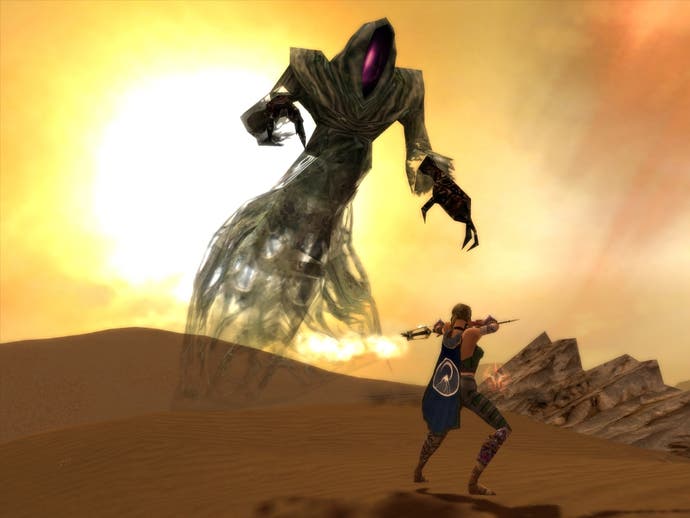
The map screen, as well as showing all the local enemies, can also be drawn upon with the mouse pointer. This allows you to direct your friend's attention to interesting things and/or drawing enormous phalluses.
By double-clicking any of your team-mate's names, you'll walk directly to them. By holding down ALT, it reveals all the name tabs of people in the area, even out of sight. Clicking any of those will make your character wander off and locate them. Especially useful in a city, where you can click ALT, find a desired merchant's tag, and locate him in seconds.
The fact you can teleport between any of the hubs, at any point. Travelling time: zero.
Each character has statistics specific to them. Warriors don't have any skills related to magic. In other words, anything you can spend your experience on is of use to you. Rather than having to ignore a whole selection of numbers on your character sheet, you're given relevant options to consider.
Niggling problems
The game's world is arranged into three sections: America, Europe and Korea. By default, you arrive in your local one. For most of us here, it'll be Europe. However, while most MMOs have language specific servers, the grand mass of multilingual Europe are filtered in randomly. No matter what language you speak, you'll be surrounded by people who don't, which makes gathering a team tricky. Multilingual exchange students will be in heaven. Everyone else will learn how to say "you suck, you newb" in German.
While the actual playerbase can't ruin what happens when you're inside instanced environments, in the hubs they're generally an unfriendly bunch. Not quite Neocron levels, but still often alienating. Ideally, you'll want to build up a friends list of players who aren't half-bright simpletons. But isn't that true of any online RPG?
While much of the interface, especially the hidden elements which you uncover as you progress, is brilliant and progressive, some of the basics feel a little odd. Control and animation feels a little weightless, compared to the solidity of something like World of Warcraft or even City of Heroes. The lack of a jump function and invisible walls to stop you falling off ledges will cause problems until your brain realigns to the game's design decisions. Actual targeting is another minor bugbear. While hardly badly turned out, it's not as polished as Blizzard's baby.
While it's possible to play through the vast majority of the game solo with the AI-sidekicks, they're hardly the brightest bunch. While anyone will have seen much worse, they can and do go wrong. And it annoys.
Not really a problem, but a part of the game that's worth stressing. It isn't the endless grind-based MMO which you may be accustomed to. In terms of single-player content, a determined player will see it off in a vaguely achievable time-span. That said, there's more to it than you may initially notice, with many optional quests easy to overlook. Equally, the game's quests alter and open depending on your character class. Certainly, it has enough content to match almost any single player RPG you care to mention. Replaying with an alt is positively encouraged, if only to unlock some more skills from a different class for PVP.
Things that don't happen in Guild Wars
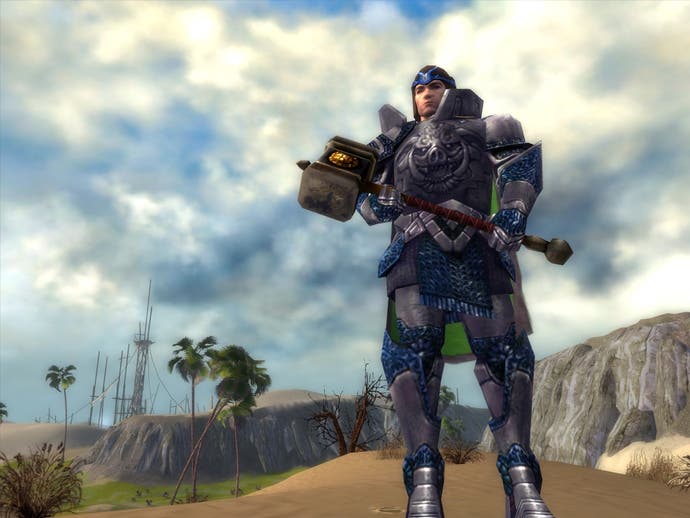
You're adventuring in a field, in a close-run fight. A monster spawns behind you, runs up, joins the brawl and kills you. Gahk!
Realising the person you want to play with is on the other side of a continent so you'll have to spend at least three hours making your way to them if you want to adventure together. Or, even worse, that your friend is playing on a different server so you'll never be able to adventure together.
Standing patiently in a queue of twenty adventures, all waiting their turn to kill a monster that spawns once every few minutes, which everyone needs to complete a given quest.
Realising that, due to a choice you made ten hours ago which you didn't possess the knowledge to know better, that your character is now fundamentally ruined. Or realising that a decision you've just made is going to cripple your player for the couple of days play until you fix it. Or you being afraid to play with your characters possibilities because there's no way to fix it.
Someone stealing the kill you've spent the last half-hour hunting down, making you want to transform your body into a series of electric impulses, shoot off down the phone line, across the internet and to appear in the whiny little bastard's room to club him to death with his own monitor.
You accidentally stealing someone's kill and being abused by a stranger, making you feel bad for hours.
A persistent, nagging feeling that you're going to look back in fifty years time and realise you wasted years of your life on tasks a simple scripting-program could manage with equal aptitude.
Dumbass fanboy-esque reasons reasons why I love Guild Wars
The fact that characters have to have two names. It's clearly a utility thing, since anybody can play anybody in the world they have to force a greater variety of names to avoid duplicates. Splendidly, it actually leads to everyone having names that sound like something out of a Fantasy-styled Noir-novel, like Donald Axe and Laura Fibia rather than just a random collection of consonants.
That all the characters are so ludicrously beautiful to the point of absolute silliness. It's as if a gallery of Greek sculpture stepped down from their plinths and started running around. In one memorable moment, a friend and I are running past a bare-chested barbarian sort. My friend stops, points at him and states "That is a beautiful man," before running off. If there's been a more ludicrously homoerotic Online RPG, I've yet to see it. And the women are enough to make Angelina Jolie get an inferiority complex.
The phrase "Two years later". Won't mean anything until you play it, but for an online-RPG to do something as stylish and audacious as a time-jump in the plot is brilliant. In fact, this isn't even a fanboy-esque reason, but an example of how the increased instancing allows far more room to play with in the plot. For example, the early quest where you get to fire an enormous catapult at an oncoming army. My delighted party all typed "Oh YES!" (with an array of cheery swearing lobbed in) in response. These are the things we play games for.
The plot revolves around an enormous horn. Missus.
Fundamental reasons why Guild Wars is aces
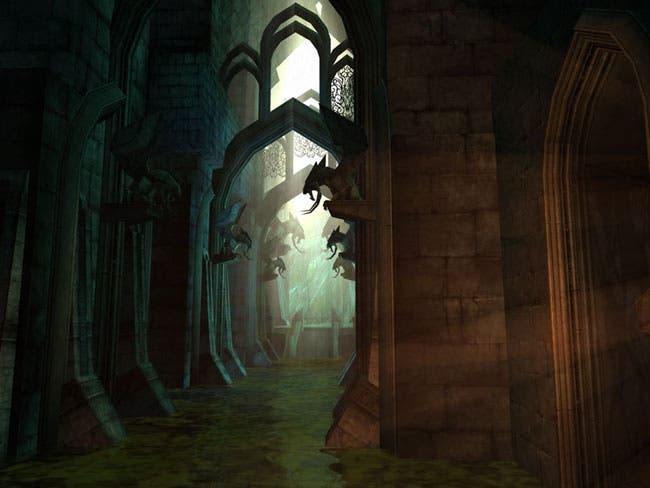
Now, I love World of Warcraft. Brilliant game. However, in the first fifteen levels of play I made precisely two decisions which impacted on my game experience in any meaningful way. That was choosing my race and choosing my character class. Other than that, I went on the same quests, gained the same powers and fought the same baddies in just about the same way as everyone else of my character class and race. I worked out tactics, but they were the tactics which everyone would have worked out from looking at the skills they're dealt. Talents opened up at level 10, but those one-percent damage bonuses are absolutely meaningless for many levels after that. Wow: I'm doing 50.5 points of damage instead of 50. Now we're cooking gas, mo-fos.
Guild Wars is different. In fact, Guild Wars throws you in the deep end to a way that could even alienate some people. Within a couple of quests you're being asked to decide on which secondary character class to choose. In my case, I'm already thinking about how my powers can be utilised, and what I would like as an auxiliary set. Perhaps the monk skills for a more support role? Or maybe I'll concentrate in close-combat energy-draining necromancy, and have a warrior secondary to make a vampire-esque character? Because of the enforced limit of eight powers at any time, and the increasingly large array of options, you're constantly looking at the game and working out how best to tweak your character. Best of all, even fairly esoteric ideas, if they can be conceived, operate in a manner which work in a way you'd expect. This turns the single-player game into something where you're experimenting, thinking and re-evaluating constantly (since it's easy to rejig your abilities), and the multiplayer game into a Red-Queen-style evolutionary race between your ideas and the rest of the world's.
In other words, it's the Fantasy Online RPG where actual skill and intelligence matters more than mere persistence. Which is a rare case of what a developer promised in pre-release hype actually being what appears in the game. Lummee.
So this is an Online RPG for virtually anyone. The array of character builds and focus on warring guilds makes it a dream for those who enjoy online rucks. The more off-line adventurer has a huge world and extensive plot to fight their way through. The more traditional MMO player can bounce between either pole, perhaps grumbling that there's not as much continuous content as they're used to, but sated by not having to pay any kind of subscription just to be there. And the single-payment model encourages anyone to give it a try. At its core, Guild Wars is a game which has realised that a massively-multiplayer online game can be an online game and not a world. Purists will sneer at it. And I'll be sneering right back at them, the killjoys.
And getting back to it, it's my favourite game of the year so far.

